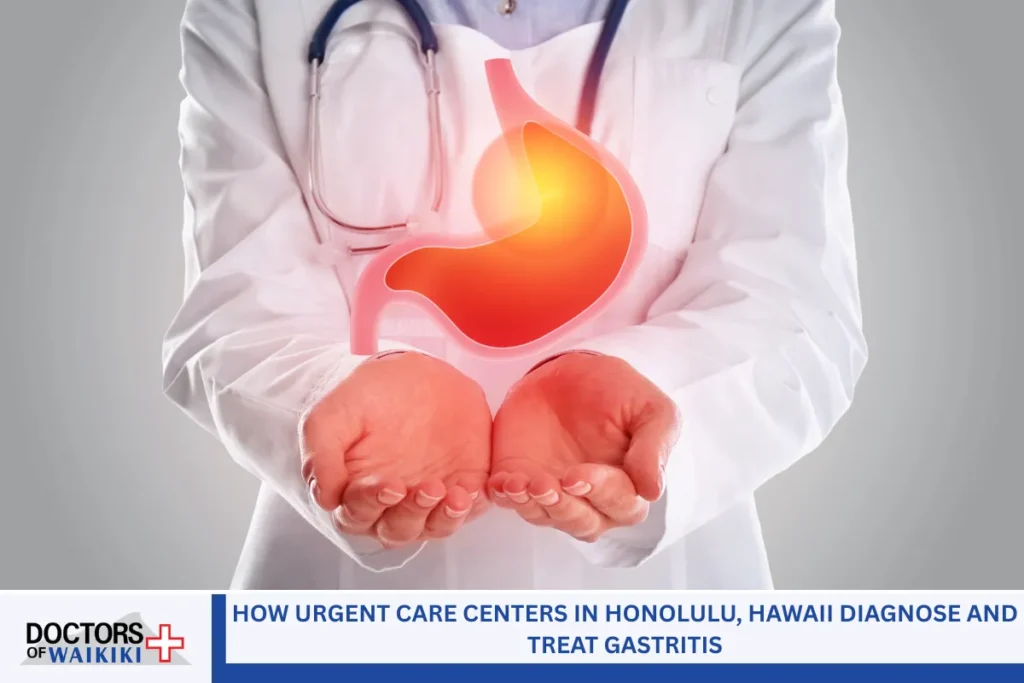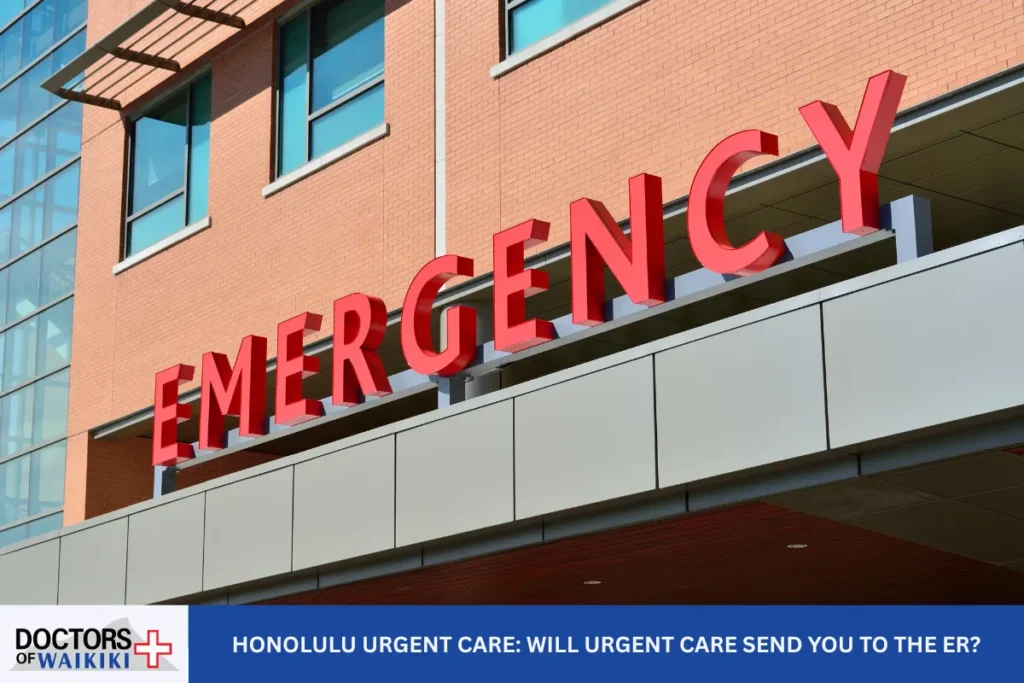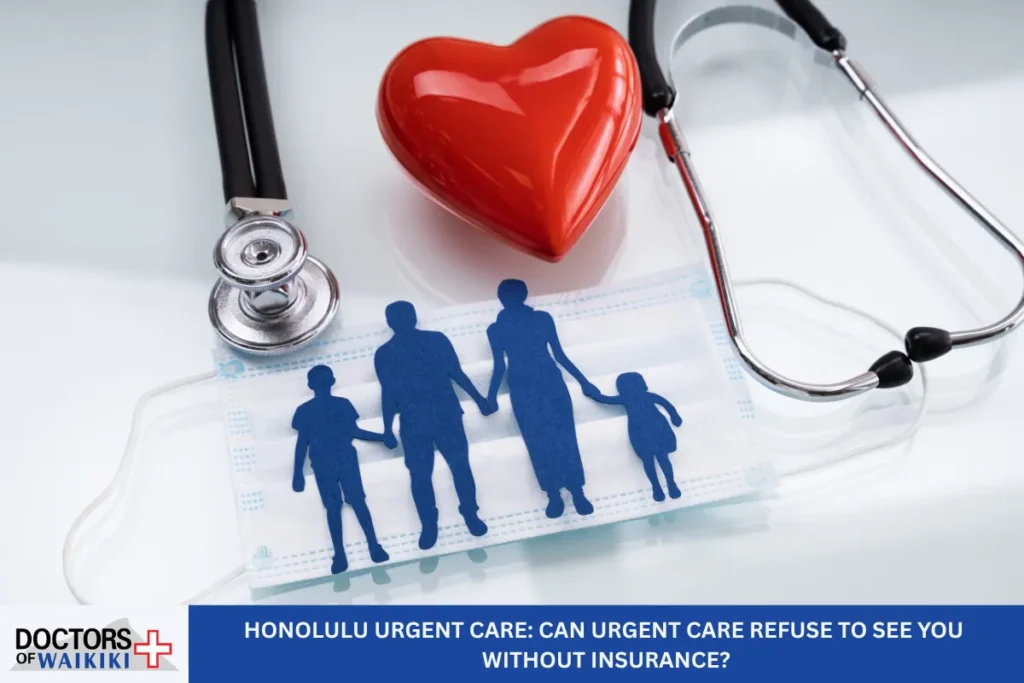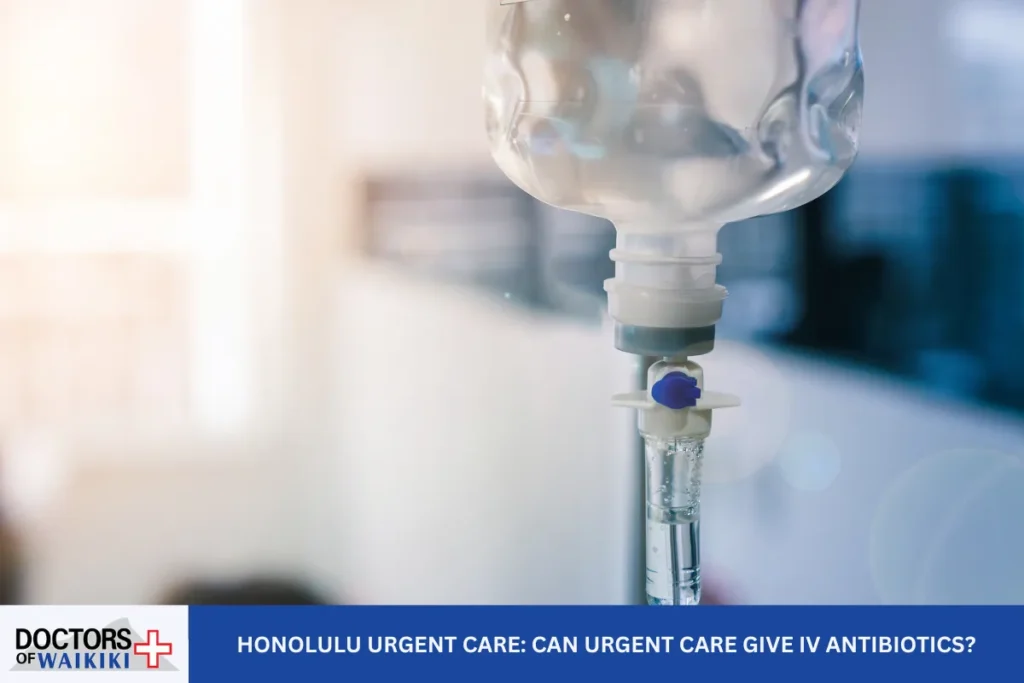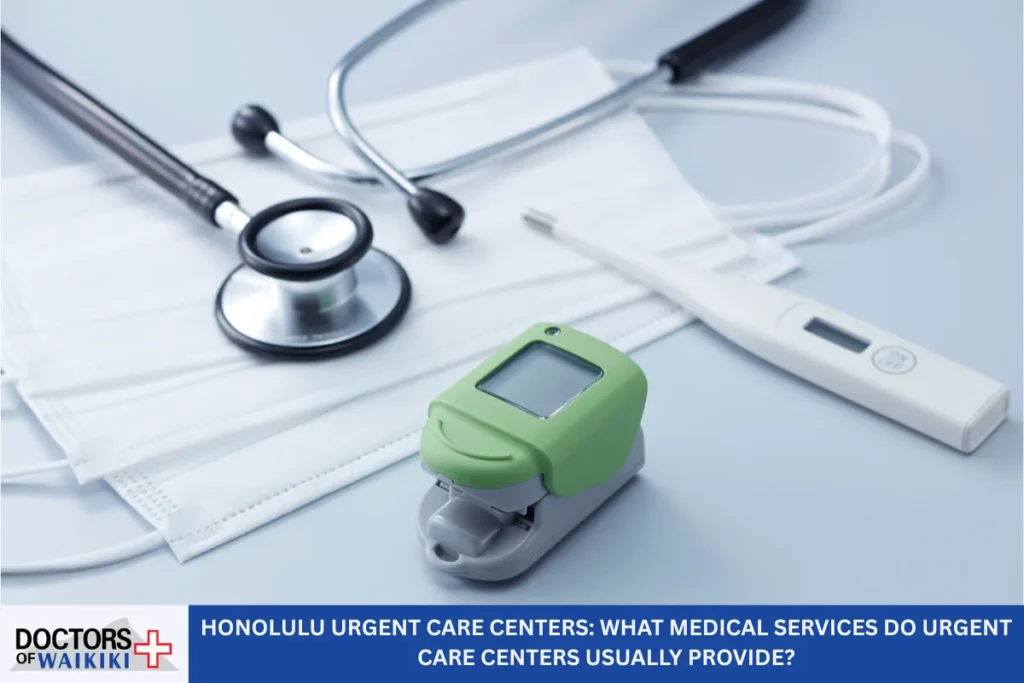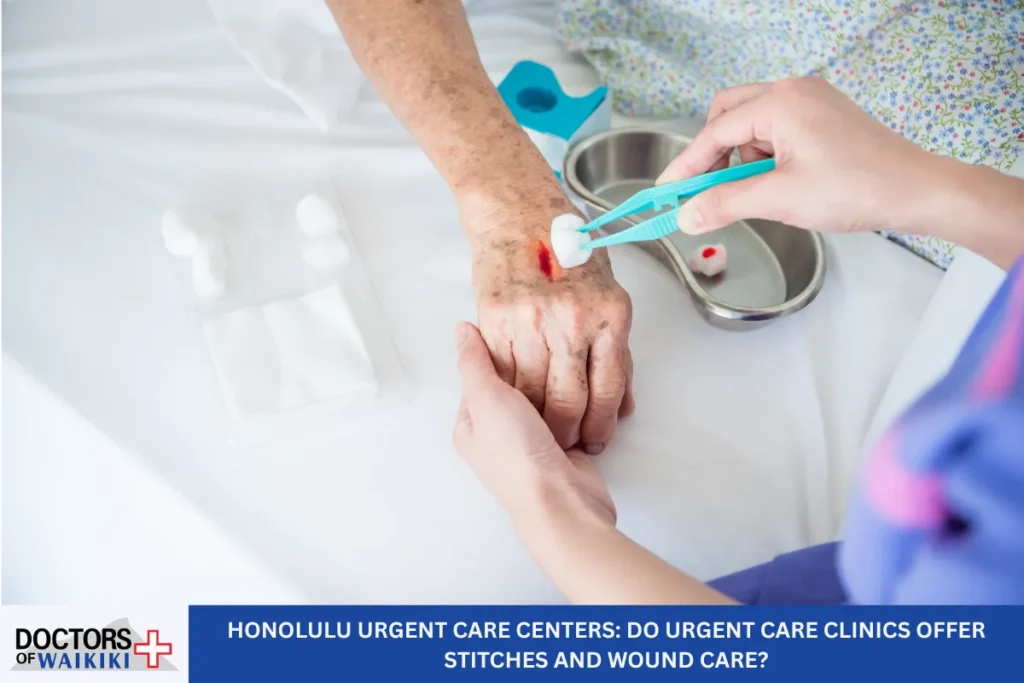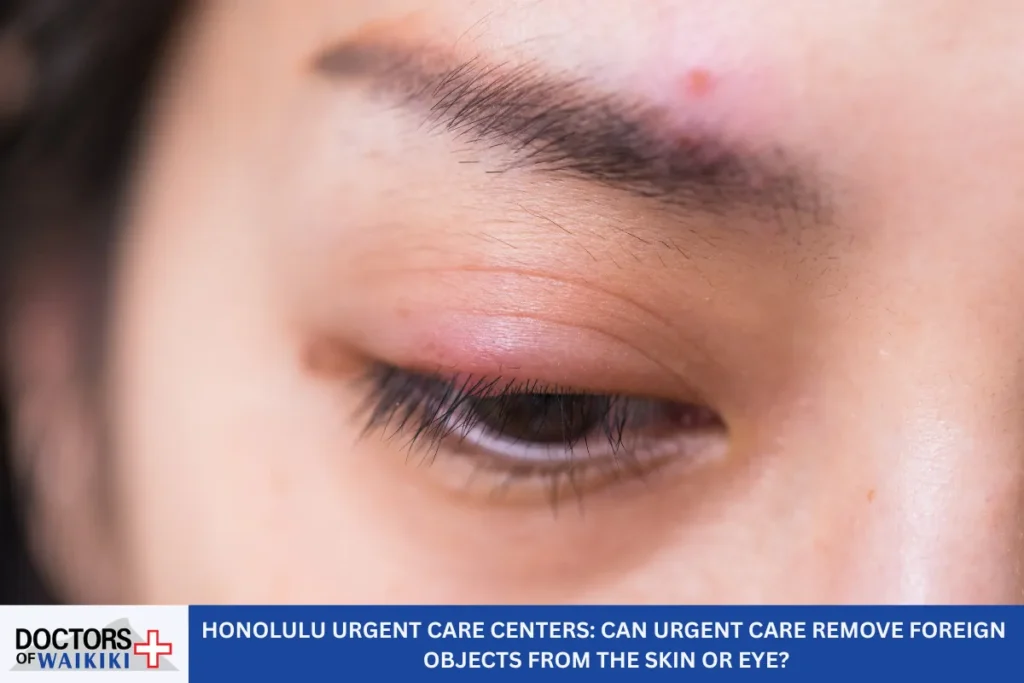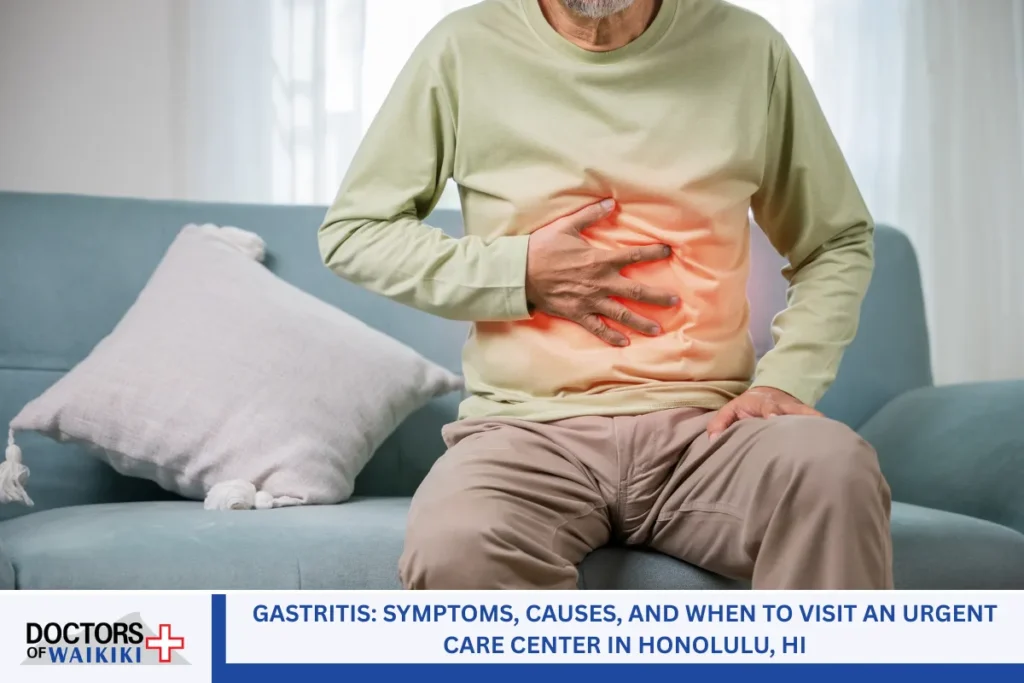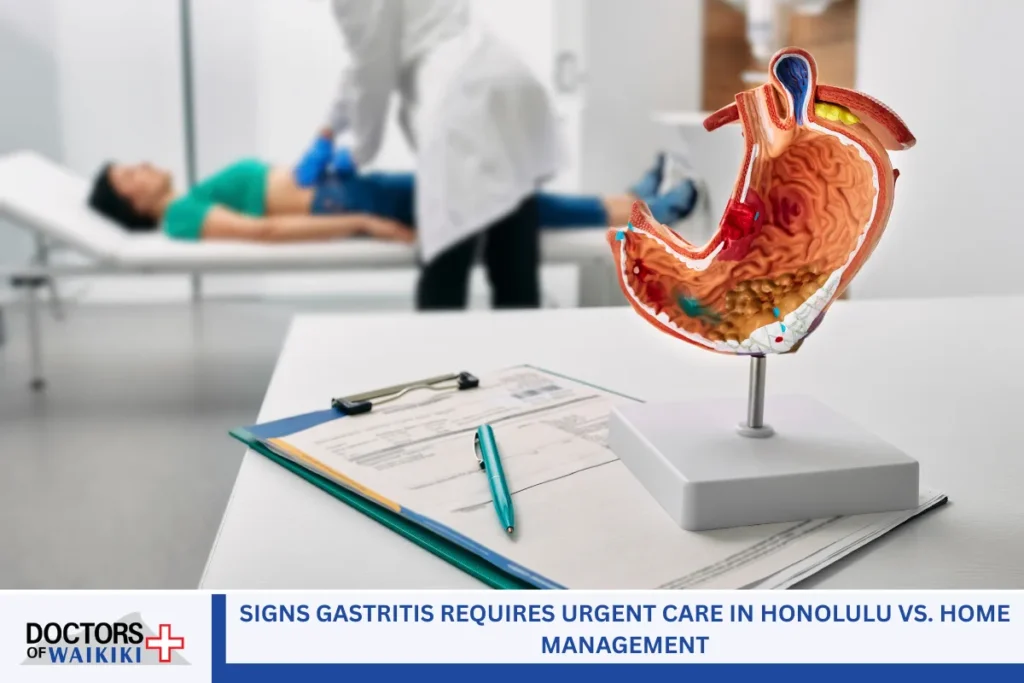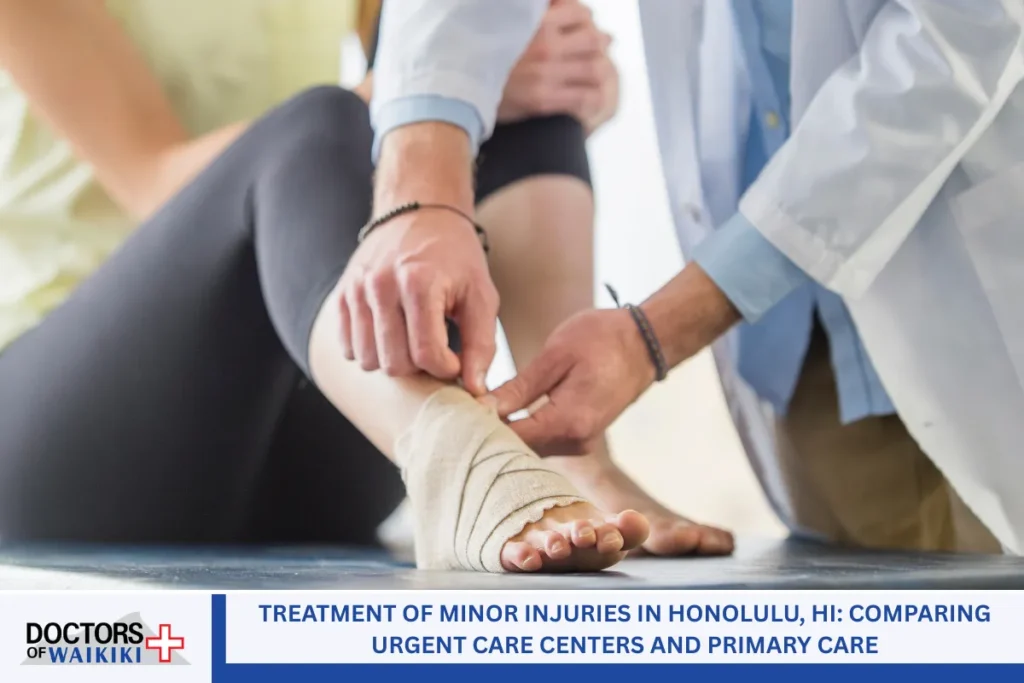Finding Relief Fast: Why Honolulu Residents Turn to Their Local Urgent Care Center for Gastritis Help
If you or a family member is struggling with sudden stomach discomfort in Honolulu, visiting an urgent care center may be the fastest way to get help. Gastritis—an inflammation of the stomach lining—can strike suddenly, causing severe pain, nausea, and even gastrointestinal bleeding. Without prompt medical care, acute gastritis may worsen and lead to chronic gastritis, ulcers, or even more serious health care issues. Too often, people wait too long, hoping symptoms will pass, only to find themselves in the emergency room for urgent medical care. Honolulu’s urgent care clinics, open for walk-in visits, offer immediate access to a medical team, advanced diagnostic equipment, and a range of treatments that can help relieve symptoms fast—without the wait or expense of the ER.
Recognizing Gastritis: Common Signs and Symptoms to Watch For
Gastritis can have a variety of causes and symptoms, making it important to recognize the signs early. Patients visiting a walk-in clinic in Honolulu may report:
- Stomach pain or burning sensation
- Persistent nausea or vomiting
- Loss of appetite
- Stomach cramps or bloating
- Blood in stool or black, tarry stools
- Vomiting blood
- Unexplained weight loss
- Feeling full quickly when eating
Other symptoms may overlap with conditions like irritable bowel syndrome, food poisoning, stomach flu, or even heart disease. A primary care provider or nurse practitioner at an urgent care facility can distinguish between these and help you get the right treatment plan.
Understanding the Causes: Why Gastritis Develops
There are several possible reasons for the development of gastritis, including:
- H. pylori infection – The most common cause, this bacteria can be acquired through fecal-oral transmission.
- Excessive alcohol use – Damages the stomach lining and increases acid production.
- Regular use of NSAIDs (nonsteroidal anti-inflammatory drugs) – Can irritate or erode the stomach lining.
- Autoimmune disorders – Such as autoimmune atrophic gastritis, where the immune system attacks healthy stomach tissue.
- Bile reflux – Backflow of bile into the stomach from the small intestine.
- Severe stress or trauma – Surgery, burns, or major injuries may trigger acute gastritis.
- Infections – Aside from H. pylori, viral (such as the influenza virus), fungal, or parasitic infections.
- Other factors – Smoking, spicy foods, or chronic vomiting.
These underlying causes are carefully considered by the healthcare providers and staff at a Honolulu urgent care clinic during your medical consultation.
The Diagnostic Process: How Honolulu Urgent Care Clinics Identify Gastritis
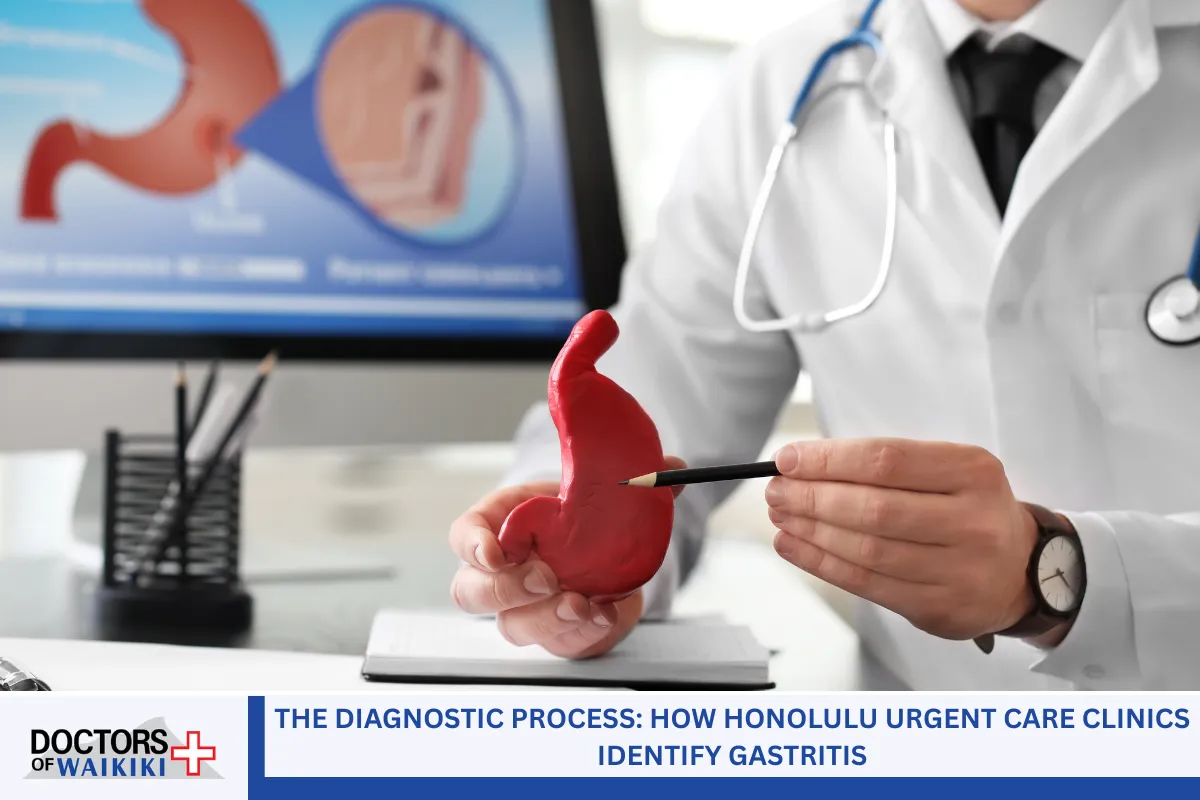
Step 1: Comprehensive Medical History and Physical Exam
When you walk in for urgent care services, medical assistants and advanced-practice providers will gather detailed information, including:
- Medical history information
- Medication and supplement use
- Recent travel, food, and water intake
- Family history of gastric diseases or stomach cancer
- Description of symptoms, such as runny nose, watery eyes, or allergy symptoms and treatments (if applicable)
The healthcare providers will then conduct a gentle abdominal exam to check for tenderness or swelling.
Step 2: Diagnostic Tests and Lab Services
Depending on your symptoms, the urgent care center may order one or more of the following:
- Blood tests – To check for anemia, infection, or antibodies related to H. pylori infection and autoimmune disorders.
- Stool sample or stool test – To look for blood, infections, or parasites.
- Breath test for H. pylori – A non-invasive test to detect active H. pylori bacteria.
- Upper GI series or barium swallow study – X-ray tests to visualize the digestive system and check for ulcers or structural issues.
- Digital x-ray – Sometimes used if other gastrointestinal condition or orthopedics issues are suspected.
- Lab and test results – Provided quickly, so your treatment plan can begin without delay.
Honolulu urgent care clinics are equipped with modern diagnostic equipment and accessible exam rooms, making them a convenient option for immediate care.
Step 3: Additional Diagnostic Services
If initial test results suggest more complex issues—such as autoimmune metaplastic atrophic gastritis, gastrointestinal bleeding, or peptic ulcer disease—medical professionals may recommend further diagnostic studies, such as:
- Endoscopy – Referral to interventional endoscopy for direct visualization and biopsy of the stomach lining.
- Micronutrient panel – For chronic or recurring gastritis cases, to check for nutritional deficiencies.
- Antibody titers – For autoimmune gastritis and related conditions like hashimoto’s disease or other auto-immune disease.
- Biometric testing – For patients with chronic conditions, occupational health concerns, or immigration physicals.
Immediate Relief: Treatment Approaches at Honolulu Urgent Care Facilities
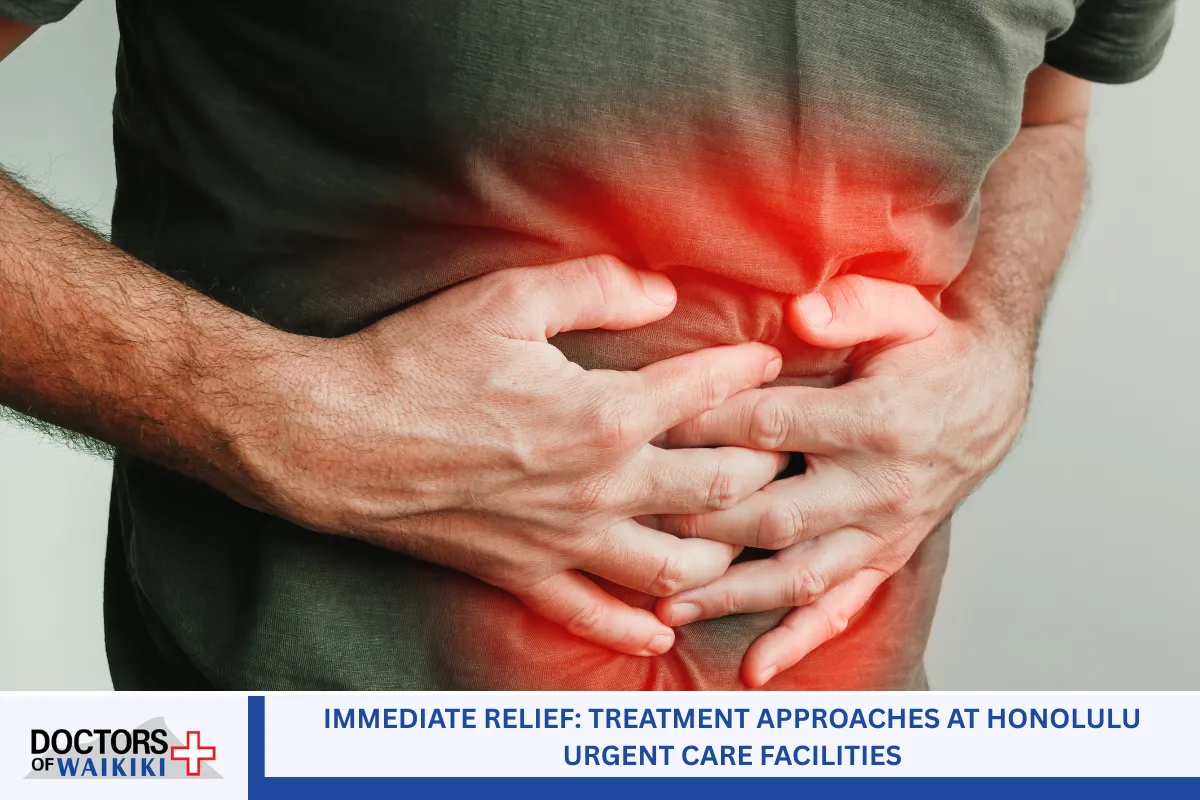
Symptom Management and Medical Care
The medical team, including board-certified doctors and nurse practitioners, develops a personalized treatment plan based on the severity and cause of your gastritis. Common approaches include:
- Proton pump inhibitors – Reduce stomach acid, helping the stomach lining heal.
- H2 blockers – Such as H2 (histamine) blockers and potassium-competitive acid blockers, also reduce acid production.
- Antibiotics – Prescribed if H. pylori infection is the underlying cause.
- Antacids – For quick, temporary relief.
- IV fluids or oral rehydration salts – For patients experiencing dehydration due to vomiting or gastrointestinal bleeding.
- Pain management – Safe medications for symptom relief.
- Lifestyle changes – Guidance on diet, avoiding alcohol, managing stress, and quitting smoking.
Patients with autoimmune gastritis may require additional treatments, including vitamin B12 injections and monitoring for complications like gastric cancer or stomach tumors.
Managing Acute vs. Chronic Gastritis
- Acute gastritis often resolves with prompt medical care and symptom management.
- Chronic gastritis may require ongoing visits, periodic diagnostic services, and regular communication with a primary care physician or specialty urgent care provider.
Monitoring and Follow-up
Your urgent care clinic will provide clear instructions for follow-up, including:
- When to schedule a return visit or appointment for lab tests and further evaluation.
- What symptoms indicate a possible medical emergency (such as severe pain, blood in stool, or persistent nausea).
- How to access your medical records and test results.
- Assistance with insurance questions, payment in full options, and support for uninsured patients.
When to Visit an Urgent Care Center for Gastritis in Honolulu
While some cases of stomach discomfort may be mild, certain situations require immediate evaluation at a walk-in clinic or urgent care facility. These include:
- Sudden, severe stomach pain or cramps
- Blood in vomit or stool
- High fever or signs of infection
- Signs of dehydration (dizziness, rapid heartbeat)
- Inability to keep food or liquids down
- History of chronic gastrointestinal conditions, such as Crohn’s disease or inflammatory bowel disease
If your symptoms are severe or accompanied by chest pain, confusion, or fainting, go directly to the hospital emergency room or call 911. Otherwise, a Honolulu urgent care clinic offers fast, affordable, and convenient care for nonemergency conditions.
Insurance, Payment, and Accessibility at Honolulu Urgent Care Centers
Urgent care centers in Honolulu are designed for patient convenience and affordability. Most clinics accept a wide range of insurance plans, and medical professionals will verify your insurance at check-in. If you don’t have medical insurance cards on hand or are uninsured, payment in full is typically required, but many urgent care clinics offer transparent pricing and customer service support for payment options.
Walk-in clinics are open during flexible hours of operation, often including evenings and weekends, so you can walk in without an appointment. This makes them ideal for families, tourists, and local residents who need urgent medical care outside of regular primary care office hours or when facing inclement weather. For minor to moderate medical issues, an urgent care clinic is a smart alternative to the emergency room.
Accessible exam rooms, up-to-date medical equipment, and multilingual healthcare providers and staff (often including bilingual services in English and additional languages) make it easier for patients from all backgrounds to receive care. Whether you need immediate care for stomach inflammation or a routine visit for immunizations, urgent care options are designed for your comfort and privacy, following all federal and state privacy regulations for patient care records.
Lifestyle Changes and Prevention Strategies to Reduce Gastritis Risk
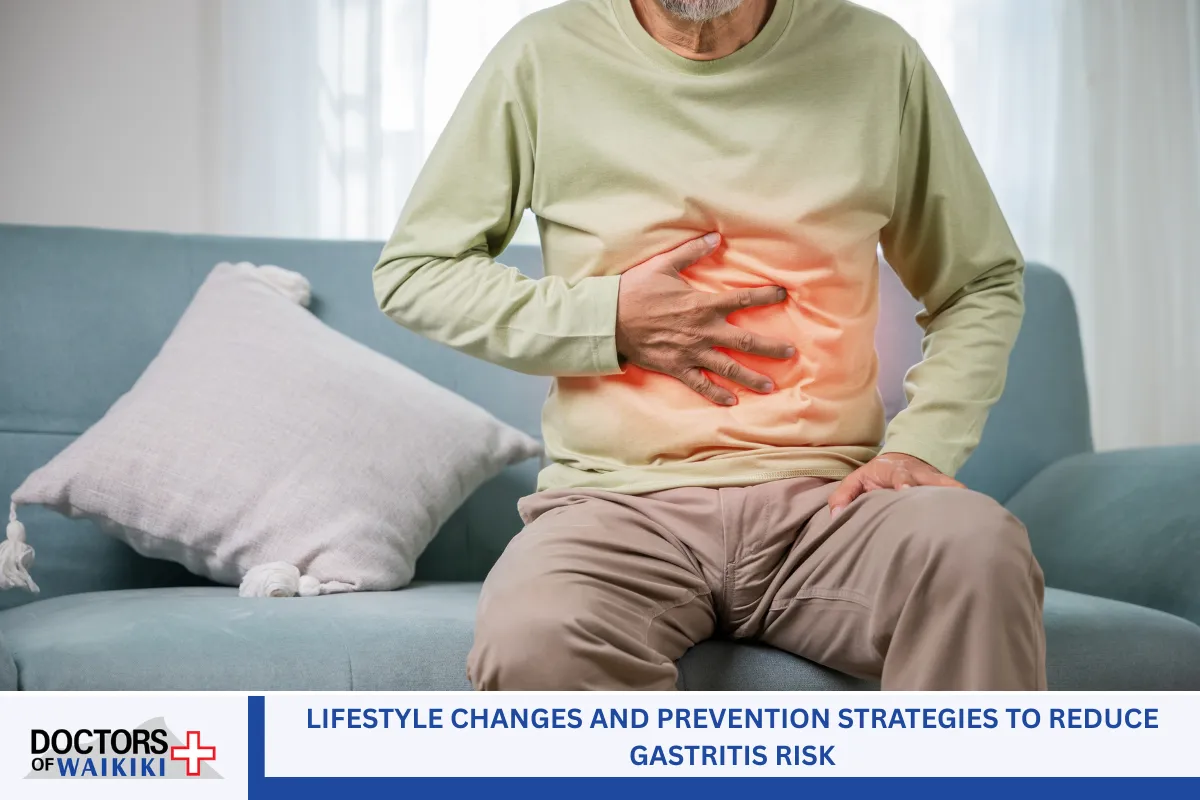
After urgent care services address your immediate symptoms, the medical team may discuss important lifestyle changes and prevention strategies to protect your digestive system and prevent future episodes of gastritis.
Essential Tips to Protect the Stomach Lining
- Eat smaller, frequent meals: Reduces irritation of the stomach lining and helps manage acid levels.
- Avoid trigger foods: Limit spicy, acidic, or fried foods known to worsen symptoms.
- Limit alcohol and caffeine: Both can damage the stomach lining and trigger flare-ups.
- Stop smoking: Smoking weakens the lower esophageal sphincter and can worsen reflux and gastritis.
- Manage stress: Stress reduction techniques can help reduce inflammation and improve immune system response.
- Practice safe hygiene: Wash hands regularly to prevent fecal-oral transmission of H. pylori or other infections.
- Use medications with caution: Avoid long-term use of NSAIDs unless prescribed by your primary care provider.
Preventing Future Complications
Patients with a history of chronic gastritis, peptic ulcer, or autoimmune disorders may be referred to internal medicine or specialty urgent care for long-term management. Preventing complications such as gastric cancer, atrophic gastritis, or gastrointestinal bleeding requires ongoing medical consultation, regular monitoring, and adherence to prescribed medications such as acid blockers or proton pump inhibitors.
Specialized Diagnostic and Treatment Services: More Than Just Gastritis Care
Honolulu urgent care facilities are equipped for a wide variety of nonemergency conditions beyond gastritis. Your local urgent care center may offer:
- Allergy testing and allergy relief: For those suffering from allergy symptoms and treatments related to runny nose, watery eyes, or seasonal allergies.
- Orthopedic urgent care: For minor injury units, setting and casting broken bones, and physical therapy referrals.
- Occupational health and workers comp injury treatment: Fast care for workplace injuries.
- COVID-19 testing and influenza virus testing: Especially important during cold and flu season or after exposure.
- Immunizations and vaccination records: For school, travel, or immigration physicals, including TB blood tests and biometric testing.
- Lab tests and digital x-ray: For a variety of diagnostic studies, including antibody titers and micronutrient panels.
- Pharmacy services: Immediate access to prescribed medications and over-the-counter remedies.
- Medical consultation for internal medicine and specialty care: Referrals as needed for further diagnostic equipment or interventional endoscopy.
These urgent care options make it possible to address minor to moderate medical issues, from stomach cramps to allergies, without the need for a lengthy emergency department visit.
Navigating Follow-Up and Ongoing Care After an Urgent Care Visit
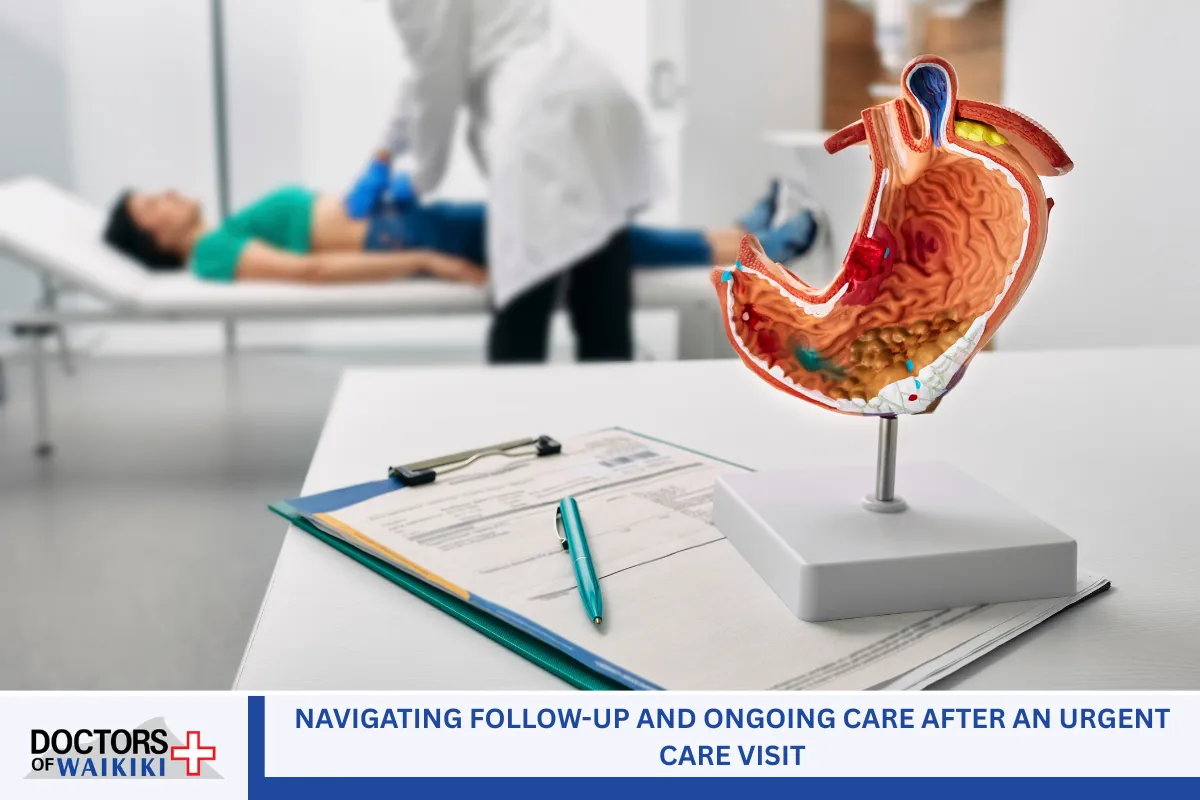
Receiving a diagnosis of gastritis at an urgent ambulatory care facility is often just the beginning of your recovery. Here’s what typically comes next:
Coordinated Care with Your Primary Care Physician
The urgent care clinic will provide you and your primary care provider with all necessary lab and test results, medical history information, and a summary of your visit. This helps ensure continuity of care and avoids duplication of tests or treatments. If needed, the clinic can also help you find a physician for specialized care in gastroenterology or autoimmune disease management.
Monitoring for Complications
Be sure to report any new or worsening symptoms—such as gastrointestinal bleeding, blood in stool, persistent nausea, or symptoms of peptic ulcer disease—to your medical providers. Follow all instructions for medication use, dietary changes, and scheduled follow-up appointments. Patients who received diagnostic services for more complex conditions (such as autoimmune atrophic gastritis, intestinal metaplasia, or gastric polyps) may require additional monitoring, minimally invasive treatments, or advanced practice provider consultations.
Accessing Your Medical Records
Most Honolulu urgent care clinics maintain up-to-date patient care records, accessible through secure online portals. This helps you keep track of your treatment plan, vaccination records, lab and test results, and upcoming appointments.
Why Choose a Honolulu Urgent Care Center for Gastritis?
Choosing a walk-in care center or urgent care clinic in Honolulu offers several distinct advantages:
- Quick access to experienced medical professionals without a long wait
- Comprehensive urgent care services for nonemergency conditions
- Modern medical facility with advanced diagnostic equipment
- Bilingual healthcare providers and staff
- Convenient hours of operation for busy schedules
- Affordable options with or without insurance
- Personalized attention and a focus on patient comfort
Whether you need immediate help for stomach pain, allergy relief, or support managing chronic medical conditions, Honolulu’s best urgent care centers offer compassionate, efficient, and reliable care for the whole family.
Final Thoughts: Your Trusted Partner for Gastritis and Beyond
When it comes to sudden stomach discomfort, gastrointestinal bleeding, or persistent nausea, don’t wait for symptoms to get worse. Honolulu’s urgent care clinics are your go-to option for immediate care, advanced diagnostic studies, and compassionate support. From managing acute gastritis and testing for H. pylori infection to providing allergy relief and physical therapy, the urgent care facility is there when you need it most.
Get back to feeling your best—walk in today, schedule an appointment, or find a physician for follow-up care. Your health and peace of mind are the top priorities for the medical team and staff at every Honolulu urgent care center.
Urgent Care Center in Honolulu, Hawaii — Doctors of Waikiki
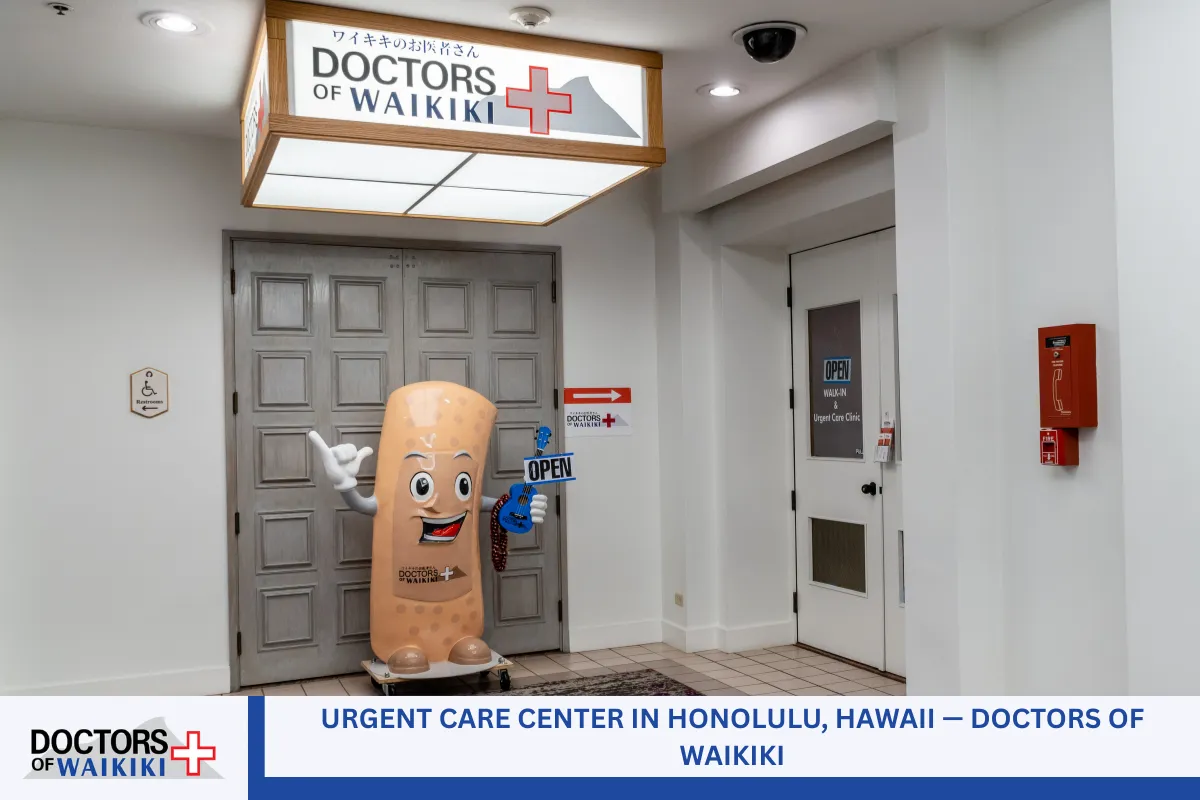
If you’re experiencing stomach discomfort, gastritis symptoms, or need fast medical help, Doctors of Waikiki is your trusted urgent care center in Honolulu, Hawaii. Our walk-in clinic offers immediate care for nonemergency conditions, from gastrointestinal issues to allergy symptoms and more. You don’t need an appointment—simply walk in and be seen by our skilled medical professionals. We provide urgent care services for locals and visitors in Honolulu and nearby areas, with modern diagnostic equipment and compassionate care. Don’t wait for symptoms to get worse. Call us today at (808) 922-2112 or fill out our easy online contact form for quick assistance. Choose Doctors of Waikiki for fast, friendly, and professional healthcare.
Frequently Asked Questions: Gastritis Care at Walk-In Clinics
How fast can I get treatment at an urgent care center?
Most urgent care clinics in Honolulu accept walk-in visits and offer same-day appointments. Many patients are seen within 30 minutes, depending on the time of day and the severity of symptoms.
What should I bring to my appointment?
Bring a list of your current medications, medical insurance cards, photo ID, and any relevant medical records if available. Be prepared to share details about your medical history information and current symptoms.
Can urgent care centers treat other conditions during my visit?
Yes! In addition to gastrointestinal condition care, urgent care services include immunizations, orthopedic urgent care, physical therapy referrals, allergy testing, and more.
Will my insurance cover the visit?
Most urgent care centers accept major insurance plans, but coverage may vary. The front desk team can answer your questions and help you understand any copays or out-of-pocket costs.
Read Treatment of Minor Injuries in Honolulu, HI: Comparing Urgent Care Centers and Primary Care

